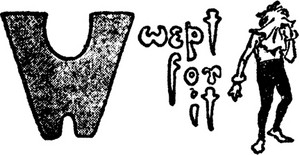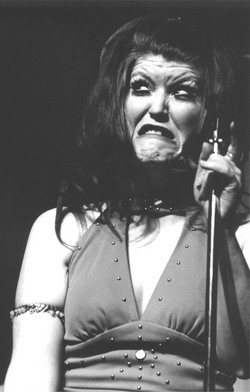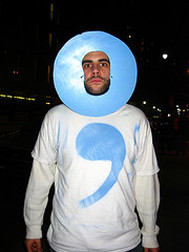|
|
 |
 |
I was in the most dangerous part of town you could imagine. It reminded me of the most hellish neighborhood in the Australian Outback. A large woman with a dark complexion came out of a building (which I associated with a prison) and asked me to do her a favor. She said she needed help pushing a tissue through a slot across the street. The tissue was draped over the end of a tool, presumably a screwdriver. The task sounded simple enough, and she was pushy enough that I obliged. She walked behind me, thrusting me forward rather gruffly, and I told myself not to take her behavior the wrong way. I imagined that she had many children and was experienced in having to shove them around to keep them in line. Up ahead I saw our destination, and it filled me with fear. It was like a solitary phone booth, but it was a cage with prison bars, and it was virtually bursting with menace. I suspected that someone criminally insane was inside that cell. "What's going to happen?" I asked my companion. "I don't know" was all she said, though we were both thinking that those bars could give way any moment. When we got up to the cage, I saw that it was swarming with many people inside, all either criminally insane or hopelessly deformed monstrosities. I couldn't help but wonder whether or not there were better ways to deal with these people than this outdoor cage -- weren't there advances in plastic surgery that could help? Or were their grotesque deformities evidence of a twisted energy present at the time of reincarnation? And should we be suspicious of dwarves? The woman ushered me toward the bars, and I cautiously inched the screwdriver toward the bars until the tissue fell off and was grabbed by one of the crouching inmates. Then the woman and I fled as fast as we could, lest the little prison cell break loose like a Pandora's Box and subject us to the fallout. Later in the dream, I was telling this experience to my mother, and I recalled more details. I remembered feeling that something had to be resolved regarding this prison. I went back to it, and this time the inmates were quiet, calmly studying me. I looked at my hand, then realized what to do. The cage now inexplicably half full of water, I dipped the screwdriver into the water so as to drip some of the water onto my palm. The water was thick and opaque and looked like semen. I knew that I had to cut myself and allow the water to mix with my blood. I knew that this water was from the River Styx, and that instead of poisoning me it would give me immortality. I pushed the screwdriver (which I now noticed to be barbed) all the way through my palm without pain.
 |
| If you have a strange dream to share, send it along! |
|

 |
SONG: I Wanna Be A Dancin' Man
ALBUM: The Belle of New York Soundtrack
ORIGINAL LYRIC:
Gonna leave my footsteps on the sands of time,
If I never leave a dime.
ADJUSTED FOR INFLATION:
Gonna leave my footsteps in bricks and mortar,
If I never leave a quarter.
 |
| * Payphones used to take dimes, but now they take quarters. Isn't
it time to update song lyrics to reflect the realities of
inflation? Alas, it's vastly easier to rhyme the word "dime" than
the word "quarter," but here at Inflationary Lyrics Headquarters we
have risen to the challenge. Please join the fun and share your
own inflationary lyrics, with both the "before" and "after" versions! |
|

 |
I dreamed I couldn't be sure the independent clauses were not joined by a connective.
Later that night, I dreamed I visited Arabia, where my people walk upside down.
Then I dreamed that I was a Greek question mark, though of course I looked the same as I always do.
That was followed by a nightmare about a young bully named Nicholas
Semicolon, strikingly similar to the shameful character with the same
name in HELLO, MRS. PIGGLE-WIGGLE by Betty MacDonald. |


 |
BacktrackingThis is the oldest trick in the book. These are the same people who attacked us earlier. This is just round two.
—Diane Carey, Challenger (2000)
|


 |
"Is nothing sacred?" Yes. Atheism is a doctrine that there
is no God. However, many atheists are devout in their lack of
belief, which makes them religious in spite of themselves. So to
them, nothing is indeed sacred.
|

 |
|
|
 |
 |
Can you name the "hottest" letter of the alphabet? Or the most
"upscale" letter? It seems that car manufacturers have created a
shortage of "luxury letters." NBC4 explains:
Luxury cars used to be called El
Dorados or Town-and-Countrys. Now they're called "M-35" and Q-45
and MDXs. And the Wall Street Journal reports that's creating a
shortage of luxury letter and number combinations. As it stands,
22 of the alphabet's 26- letters have been taken.
Letters "S" and "Z" are in great demand. But neither comes close
to letter "X", which is the hottest letter. And nobody wants O,
P, U, or Y which are seen as too ordinary for upscale. By the
way, B, F, and N are lousy letters too. But the way I see it, the
letters L, I, and Z make a delightful car combination. |

 |
I dreamed that I was with an older woman (perhaps in her 60s), who was
leading me on some sort of swimming expedition. We came across
some stalagmite-type formations sticking out of the water, and my guide
encouraged me to view them by partially submerging my face so that the
top half of my eyes saw what was above water level and the bottom half
of my eyes saw what was submerged. I indicated that I already
knew that the formations continued underwater, but she insisted that I
view it for myself. Afterwards, we swam toward a farther
destination, and the experience of swimming was transcendently
pleasurable. I found that I couldn't sink and therefore could
devote myself to swimming with absolutely no fear, much as a fish must
feel. The feel of the water itself was also astonishingly,
transcendently pleasurable. It had no temperature (neither warm
nor cold), but I felt so at home in it that it bordered on
ecstasy. I felt wholly in my element, at one with the ocean, and
enjoyed that swimming more than anything else I've ever done in my life.
 |
| If you have a strange dream to share, send it along! |
|



 |
|
|
 |
 |
| I Found a Penny Today, So Here's a Thought |
(permalink) |
 |
 |
 |

When I was 9, my 5-year-old kid brother convinced me that the craters
of the moon formed the face of Abe Lincoln. I didn't believe him
at first, but he seemed so sure. To children, Lincoln certainly
comes across as a demigod, beardedly sitting on that throne and
austerely bestowing freedom. That night my kid brother summed up
just how much "cents" I had. He probably could've had a field day
pointing out all sorts of imaginary constellations, such as the
heavenly chariot of the divine Abraham (I would have fallen for that
one right away, because I always thought the Lincoln Memorial on the
back of the penny was a trolley car). But I couldn't for the life
of me follow the line of my brother's finger all the way to the
heavens. I didn't realize then that all constellations are
made-up, formed by those who can picture the puzzles of life and
convince others to connect the dots.
Reader Comments:
Jonathan wrote,
I was obsessed with A. Lincoln when I
was in third grade. I somehow got the idea that I was supposed to
have a favorite president. I
chose Lincoln because of the Emancipation, and then went "all-out" in
the same compulsive way I embraced my faves The Partridge Family.
Highlights of this bizarre behavior included an essay for school in
which I said they should rename "I Love Lucy" as "I Love Lincoln."
|

 |
Asking the Same Question Again LaterIt was one of the oldest tricks in the book. Ask some questions, wait a while, then ask ’em again.
—Ben Rehder, Buck Fever (2003)
|


 |
|
|
 |
 |
How can one express "what language is incapable of putting into
words?" Does relinquishing logical language foster unity with all
living things? The Theatre of the Absurd
has an innate distrust of language, preferring wordless communication
through "shapes, light, movement and gesture." The aim is "to
create a ritual-like, mythological, archetypal, allegorical vision,
closely related to the world of dreams." |

 |
"Who wrote the book of love?" The Roman poet Ovid.
|


 |
SONG: Like a Rolling Stone
ARTIST: Bob Dylan
ORIGINAL LYRIC:
I wish I had a shilling
For each senseless killing
ADJUSTED FOR INFLATION:
I wish I had a quarter
For each senseless slaughter
 |
| * Payphones used to take dimes, but now they take quarters. Isn't
it time to update song lyrics to reflect the realities of
inflation? Alas, it's vastly easier to rhyme the word "dime" than
the word "quarter," but here at Inflationary Lyrics Headquarters we
have risen to the challenge. Please join the fun and share your
own inflationary lyrics, with both the "before" and "after" versions! |
|




 |
Ask QuestionsFirst , dust off the oldest trick in the book. Ask questions [to encourage close attention and active participation].
—Ted Burda, Baseball’s Hitting Secrets (2001)
|


 |
I dreamed that I hated the fact I was two
punctuation marks in one: a period and a comma. I envied other
punctuation, especially the dash.
Then I dreamed about how
Winston Churchill "believed that in remarks directed to the ear, a
semicolon was verboten—whereas a dash fit the rhythm of a speech or
talk, making it more conversational," just as in SPEAK LIKE CHURCHILL
by James C. Humes.
|




 |
Last night I dreamed that I was walking down the street (without
pants). I was caught off guard when a dark figure (Caucasian
male) walked up beside me. I casually said "Hello," hoping he
didn't intend to mug me. In a flash, he lassoed my neck with some
sort of thin chain and pulled me in to attack me with a knife. I
fought him for a while, and though I couldn't seem to get away from
him, several times I managed to use his knife against him and actually
cut him with it. But I eventually noticed that he was not fazed
by my counter attacks. He would smile detachedly when I stabbed
him, as if the wound was not painful or perhaps was even
pleasurable. I asked him, "Who are you?" and "What do you
want?" But he just looked back at me with a blank expression as
we continued to struggle. Then I finally seemed to figure it
out. I thought to myself something to the effect of: "He's
showing me that pain and pleasure are equal, and are equally
illusory." And with that thought, the struggle ended, he
disappeared, and I woke up. I was a bit puzzled at first,
wondering why I was going over a concept that I *thought* I already
knew. But of course I'm still viewing life dualistically.
 |
| If you have a strange dream to share, send it along! |
|


 |
A Reliable Chain of Middlemen—Willem A. Veenhoven, Case Studies on Human Rights and Fundamental Freedoms Vol. 3 (1976)
|

 |
|
|
 |
 |
P I n K S L i P: Preserve the Integrity of Key Song Lyric Pronouns
When artists perform cover versions of songs, they often alter the
lyrics to match the gender of the new singer. For example, a male
singer doing a cover of the Diana Ross song "Upside Down" might change
the words "Boy, you turn me inside out" to "Girl, you turn me inside
out." It would be unheard of for a person doing a spoken-word
reading of a literary classic to change the text's gender references
according to whim. It should be equally unheard of for a singer
to alter the lyrics of a song. This all-too-common practice
violates the integrity of the original song and, in fact, often
prevents fresh new subtexts from arising.
What kind of fresh new subtexts, you ask? Consider Information
Society's cover of "Express Yourself" by Madonna. Had singer Kurt
Harland retained the original lyrics, he would have turned "Express
Yourself" into a feminist manifesto from a male point of view, making
the song vastly more interesting and important. Instead, he
alters the pronouns throughout and his remake falls flat. For
example, Harland changes the lyric "make him express how he feels and
then you'll know your love is real" to "make her express how she feels
and then you'll know your love is real." Females don't generally
have too much trouble communicating their feelings; expressiveness is
typically more difficult for males. So the changed lyrics lose
their original meaning and indeed border on the ridiculous. Had
Harland left the original pronouns untouched, he would have transformed
the song into a cautionary tale for women from a man's point of
view. The singer would be encouraging women to demand only the
best from men, benefiting both genders in the process. (The cover
version is available on the Madonna tribute album "Virgin Voices." The
original version is available on the Madonna album "Immaculate
Collection.")
Sometimes lyric alterations totally obliterate the artist's original
meaning. Take, for example, Loleatta Holoway's cover of "I Wanna
Be Your Lover" by Prince. As part of her removal of masculine
references, Holoway changes the lyrics "I wanna be your brother, I
wanna be your mother and your sister, 2" to "I wanna be your lover, I
wanna be your mother and your sister, 2." As Prince wrote the
lyrics, the singer is offering to transcend the limitations of gender
roles. He is offering the support of brotherhood, the nurturing
of motherhood, and the sharing of sisterhood to the woman he
desires. He is suggesting that he will be a new family for her,
ready and able to fulfill her every need. Holoway carelessly
erases this important aspect of the song's meaning, making her cover
version pale by comparison. (The cover version is available on the
Prince tribute album "Party O' the Times." The original version
is available on Prince's self-titled album.)
Let's contrast these bad examples with another Madonna cover, but this time one which works brilliantly:
KMFDM's cover of "Material Girl" by Madonna. A scary, distorted
masculine voice tells us that "we are living in a material world" and
that he is a "material girl." En Esch sings, "Some boys kiss me,
some boys hug me, I think they're O.K. If they don't give me
proper credit, I just walk away." By retaining the original lyrics and
switching the gender of the singer, the cover version takes an
intriguing look at the connection between materialism and gender
identity. While Madonna suggests that people use their sex appeal
to court others for personal gain, En Esch further suggests that people
of one's same gender ultimately have the most to offer and that such
courtships must be handled delicately. (The cover version is
available on the Madonna tribute album "Virgin Voices." The
original version is available on the Madonna album "Like a Virgin.")
Further insights into gender identity are gained in the following covers:
Erasure's cover of "River Deep, Mountain High" by Ike and Tina
Turner. Andy Bell of Erasure preserves the song's original
lyrics, singing such lines as "When I was a little girl I had a
ragdoll." The song takes on new meaning by exploring how gender
identities and boundaries are defined during early childhood.
(The cover version is available on the Erasure album "Innocents."
The original version is available on the album "Best of Ike and Tina
Turner.")
Biftek's cover of "Wired For Sound" by Cliff Richards. Lead
singer Julee Cruise stays true to the original song, singing "I was a
small boy who did not like his toys" and "I met a girl and she told me
she loved me." As with the Erasure cover of "River Deep, Mountain
High," this song is given added depth by examining early formations of
gender identity. (The cover version is available on the Biftek
album "2020." The original version is available on the Cliff
Richards album "Whole Story: His Greatest Hits.")
Future Bible Heroes' cover of "Don't You Want Me" by the Human
League. This popular male-female duet gets switched around in the
cover version, with the man singing that he was "working as a waitress
in a cocktail bar." By retaining the original lyrics and
switching the genders of the singers, the song explores traditional
gender roles in a refreshing new way. (The cover version is
available on the Human League tribute album "Reproductions." The
original version is available on the Human League album "Dare.")
Male-male relationship subtexts are created in the following covers:
The 6ths with Lloyd Cole's cover of "Human" by the Human League.
This popular male-female duet is here sung by two men, each apologizing
for cheating on the other during a period of separation. One man
says to the other, "I wouldn't ever try to hurt you. I just
needed someone to hold me, to fill the void while you were gone, to
fill this space of emptiness." The cover version brings new
meaning to the lyrics as it explores the challenge of maintaining
stable same-sex relationships. (The cover version is available on
the Human League tribute album "Reproductions." The original
version is available on the Human League album "Greatest Hits.")
The Beatles' cover of "Boys" by the Shirelles. Since the Beatles
often covered Motown material in their early days, no one seemed to
raise an eyebrow at this. But when you hear Ringo singing about
boys ("Well, I talk about boys, now; what a bundle of joy!") it's
rather intriguing. (The cover version is available on the Beatles
album "Anthology." The original version is available on the
Shirelles' album "25 All-Time Greatest Hits.")
Erasure's cover of "Gimme Gimme Gimme (A Man After Midnight)" by
ABBA. By preserving the original lyrics, Erasure subverts the
song into a gay anthem. Andy Bell sings, "Gimme gimme gimme a man after
midnight. Take me through the darkness to the break of the
day." (The cover version is available on the Erasure album "The
Two Ring Circus." The original version is available on the ABBA
album "ABBA Gold.")
Female-female relationship subtexts alter the storylines in the following songs:
Missing Persons' cover of "Hello I Love You" by the Doors. By
changing the gender of the singer while retaining the original lyrics,
Missing Persons brings new depth to the song. When Dale Bozzio
sings, "Do you think you'll be the guy to make the queen of the angels
sigh?" she can be referring to herself as a guy as well as referring to
a male listener. (In the Doors' version, that lyric is a bit of
internal dialog as the singer thinks aloud to himself.) When
Bozzio sings, "Her arms are wicked, and her legs are long; when she
moves my brain screams out this song," she brings a lesbian sensibility
to the lyrics. Now, the listener realizes that the beautiful
stranger on the street has many admirers fighting for her attention,
both male and female. (The cover version is available on the
reissue of the Missing Persons album "Color in Your Life." The
original version is available on the Doors' album "Best of the Doors.")
Six Pence None The Richer's cover of "There She Goes" by The
La's. By retaining the original lyrics, the band gives the song a
new female-infatuated-by-female slant. Leigh Nash sings, "There
she goes again, racing through my brain, and I just can't contain these
feelings that remain." This was a bit unusual for mainstream pop,
especially for a band with a "Christian Rock" past. (The cover
version is available on Six Pence None The Richer's self-titled
album. The original version is available on the La's self-titled
album.)
Sandra Bernhard's cover of "Me and Mrs. Jones" by Billy Paul. By
retaining the original lyrics, Bernhard transforms the song into a love
affair between herself and a married woman, thereby adding a brand new
dimension to a familiar story. Bernhard sings, "Me and Mrs.
Jones, we've got a thing going on." (The cover version is
available on Sandra Bernhard's video "Without You I'm Nothing."
The original version is available on the Billy Paul album "Me &
Mrs. Jones-Best of Billy Paul.") Similarly, Bernhard brings a
lesbian flair to "Little Red Corvette" by Prince. She sings,
"Girl, you got an ass like I never seen; And the ride... I say the ride
is so smooth you must be a limousine." (The cover version is
available on Sandra Bernhard's video "Without You I'm Nothing."
The original version is available on the Prince album "1999.")
Rebecca Romijn Stamos' cover of "Darling Nikki" by Prince. Like
the "There She Goes" cover by Six Pence None The Richer, Rebecca Romijn
Stamos brings a female-infatuated-by-female slant to "Darling
Nikki." Stamos sings, "I can't tell u what she did 2 me, but my
body will never be the same." (The cover version is available on
the Prince tribute album "Party O' the Times." The original version is
available on the Prince album "Purple Rain.")
Honorable mention goes to Momus's covers of songs he wrote for Kahimi
Karie. Momus disregards the gender references in his own lyrics, adding
new subtexts to songs he composed for a female singer. In "The
Lady Of Shalott," he describes himself as a woman: "I am a kind of Lady
of Shallot; My drawbridge, portcullis and moat; The chastity belt round
my throat." In "Mistaken Memories Of Medieval Manhattan," Momus
addresses another man in his bed: "Never wake me, boy; If you wake me
I'll die; If you wake me you'll destroy this perfect world I see when I
dream." In "The Seventh Wife Of Henry VIII," Momus is a suitor to
the notorious British king: "Well I know he might seem to be a big
brute, but he waits on me hand and foot. And when I blow upon his
flute, he plays 'Greensleeves' on a lute." In "Pygmalism," Momus
addresses a male professor: "You filled me with your breath and your
jism. You gave me life, I give you death, pig; Pygmalism."
(The cover versions are available on Momus' web site. The original versions are available on the Kahimi Karie album "Journey To The Centre Of Me." )
It is insulting to the audience to adjust song lyrics, as if we can't
take them as they were written. Should the artist perhaps alter
lyrics based upon the audience, as for example making it all male in a
gay bar, all female at a NOW meeting, or all dog at the Kennel
Club? Though it may or may not be discrimination to make this
usually heterosexual adjustment, it's certainly trite and silly, and
really more about a lack of confidence in the song than anything
else. Music, poetry, and art in any form should speak to us on
some universal level, which could not be limited by pronoun or place.
The offense of lyrics alteration lies in the superficiality of the
thing.
Please participate in the PInKSLiP campaign by submitting your good or bad song lyric examples to webmaster@oneletterwords.com
(Thanks to Ken Clinger and June Conley for sharing their expertise.)
|

 |
I dreamed I was blind and couldn't see if there was a conjunctive adverb.
Then I had a nightmare about tatty motel room in the middle of a brutal
desert, where "the beds are cheap and occasionally feature little black
periods and semicolons that reveal themselves to be hungry bedbugs,"
just as in The Devil's Highway by Luis Alberto Urrea. I woke up
scratching. I remember now that the room didn't have cable,
either. |

Page 0 of 4040


Original Content Copyright © 2026 by Craig Conley. All rights reserved.
|












